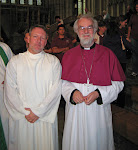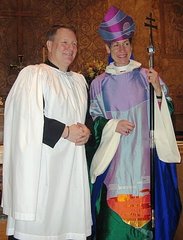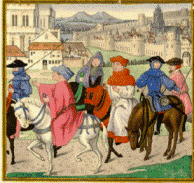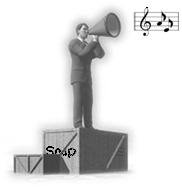Preached on Sunday, January 21, 2007 at St. James Episcopal Church, Fordham Manor,The Bronx, NY: http://stjamesf.dioceseny.org.
Lectionary readings this sermon is based on can be found at: http://www.io.com/~kellywp/YearC/Epiphany/CEpi3.html
People have certain skill sets that seem somehow innate. Most of us are good at some things, and not others. Those of us who are musical seem to be born with the ability to carry a tune and sing on key. Some of us are mathematical and can divide up a check in a restaurant in seconds. Others of us are athletic and can sink a basketball or send a soccer ball into the net with amazing accuracy. Others of us are emotionally intuitive, and can sense the feelings of others and can always find the right words to say. Others of us are literarily minded, and are drawn to books and written material for their primary source of information and enlightenment. I’m one of those. I take a book with me everywhere and if there’s something I’m interested in or have heard about but don’t understand, I’ll look for a book, or a magazine or Internet article to explain it all to me. Give me a book about something and I’ll begin to teach myself what it is I want to know.
Much as I would have liked to, I wasn’t allowed to take just English classes in high school and college. I had to take math and science and gym like all everyone does. And that’s a good thing. It’s good to know what you’re good at, and it’s good to get better at what you’re good at, but it’s also good to gain knowledge and expertise in areas that you’re not as good in. It’s good to expand your skill set and to work outside your ‘comfort zone’ a bit. If you’re a bookworm like me, one semester of accounting will make you appreciate the bookkeepers and accountants of the world all the more! So, even though we all have our specialties, stretching ourselves is a good thing, I think.
I understood why I was required to take sciences at City College of New York, my alma mater, but I didn’t look forward to it. And I was constantly on the look out for ways to avoid cutting up frogs in biology lab. City College realized that, for some of us, grisly lab experiments where useless, so an alternative was created. A two-semester course that became known as “Science for Poets” was offered. Instead of lab, those enrolled in “Science for Poets” were asked to write several long papers, but the dissection of amphibians was not required. Now, you mention more papers to most scientifically or mathematically inclined students and they groan, wail and gnash their teeth. But to a born English major like me, it was God-send! I thanked the Almighty for delivering me, and enrolled right away to fulfill my science course requirements. Between “Science for Poets” and Geology (rocks don’t gross me out the way frogs do!), I was able to graduate from the City College of New York without throwing up in a biology lab!
The “Science for Poets” professors where good guys, actually. There were two of them, and they understood their constituency. They wanted to give us the big picture, to impart an understanding of the basis of science and to do it in a way that didn’t scare us or put us to sleep. They did a good job, and used books and television shows and newspaper articles to help us see the necessity of having an understanding of the sciences. But as professors sometimes do, both instructors had to be away at a conference and a substitute took over the class for a day. The lecture topic for the day was chemical biology. The substitute did not have such a great feel for this class made up of English majors and writers. He kept getting way too technical as he was trying to explain the molecular level at which our bodies digest food. As the class became more confused and frustrated, so did our substitute professor. At one point, peppered with raised hands and questioning faces, he exclaimed (in kind of a loud voice), “Look! You’re just a tube! You’re a tube that surrounds a chemical process that breaks the chemical bonds in food to produce energy. That’s how you live! And it’s been like that since you were first humans. Everybody everywhere is just a tube designed to eat, digest and to produce energy from eating and digesting!” The class sort of sat there in stunned silence, contemplating the somewhat graphic, but sort of poetic point the professor had made. The big picture made sense to us much more so than the molecular level process. We are tubes. We eat; we digest in order to live. We are all the same and have always been so. We are one in the same in this respect. Even an English major can understand that!
Paul is, I think, making a very similar point in today’s reading from the First Epistle to the Corinthians. The Corinthians were a diverse group of people. The Romans had destroyed Corinth in the year 146bc. They then rebuilt and repopulated it, and filled it with what they considered to be the dregs of Roman society, displaced peasants, refugess, and other overflow population from Rome. Sort of like the English colonization of Australia with convicts. Ideally situated to be major center of trade, the city was one of differing, diverse and sometimes divisive populations. Corinth was the second city that Paul sought to evangelize, and he spent 18 months there working to establish a church among the city’s Jewish and Gentile populations. He’d put a lot of work into Corinth, so it’s not surprising that when word reaches him that squabbles have broken out in the church, he writes to help reconcile the warring parties.
And the Corinthians found plenty to disagree about. They were fighting over who was truly wise and mature in the faith, and who was still a “spiritual infant.” They were threatening to sue each other in the courts, they were fighting over whether to eat food sacrificed to idols, how to wear your hair when prophesying, all sorts of issues related to marriage, and sexual ethics and the role of women in the church. Sound familiar???? There was division in their ranks, and the community had begun to pull apart. People were aligning themselves with Paul or Cephas or Apollos, they were fighting over whether to follow Bishop Katherine or Archbishop Rowan or Peter. Wait, sorry, I’m getting the Corinthians mixed up with the Episcopalians. But it does sound awfully familiar doesn’t it? All the Christians letting all these issues, some trivial, some pretty serious, pull them in different directions and away from the central truth of the faith.
The Vicar in his sermon last week reminded us that even the simplest acclamation of faith can only come from God. No one can proclaim the Almighty without God providing the faith that powers the proclamation. So all of those who proclaim Jesus as Lord are united in a faith that only the true Spirit of God can give rise to. Mother Theodora Brooks, rector of St. Margaret’s in the South Bronx, used a proverb from her native Liberia at the recent celebration of Martin Luther King Day. “A mango tree,” she said, “does not give life to a banana.” The declaration of Jesus as Lord is the fruit of the Spirit of God at work in the hearts and minds of the believer. That Spirit is what unites us to God through Jesus, and it is in that Spirit that we – all together throughout the world and for eternity, past and present - comprise the one Body of Christ in the world. Paul tells the Corinthians that though they may be different, in fact they may seem to differ is substantive ways from one another, they are in fact one. They are all baptized in the one Spirit and are therefore members of the one Body of Christ, the eternal, universal, catholic church.
But it sure doesn’t sound like it then or now, does it? Our own church seems ready to split in two over issues of sexuality and gender. The churches of the Global South seem just about fed up with the rest of us in the North with our unshared wealth, our domineering ways, and our progressive ideas. WE even find this same kind of tension in the gospel reading for today. Jesus declares himself Lord and the fulfillment of the Scripture while teaching in the synagogue in Nazareth, and a few passages later, he is run out of the synagogue and out of town.
This is the Week of Prayer for Christian Unity. Running from January 18th, the Feast of the Confession of St. Peter to the Feast of the Conversion of St. Paul on the 25th, this week is one set aside when Christians are asked to pray for the unity of the church. From the sound of Paul’s letter to the Corinthians, from what we’ve discussed in our Bible Study groups about the Philippians, and the news we hear coming from the Diocese of Virginia, not to mention Tanzania and elsewhere in Africa, unity among Christians has been a rare flower, blooming briefly in certain times and in a few places, but withering quickly away amid the divisions and denouncements.
Well, maybe. But maybe not. As Paul points out, our baptism makes us part of the indivisible, indissoluble Body of Christ. We are one, whether we like it or not, and we are one whether we care to acknowledge it or not. I will regret it deeply if the diocese of San Joaquin, California or the diocese of Fort Worth, Texas decide to separate themselves from The Episcopal Church. And I will regret it deeply if the Church of Nigeria decides to leave the Anglican Communion – or worse still, tries to kick us out of it. Divisions are sobering and saddening to many of us. Especially those of us who work in the church and worship faithfully in the church and wish and pray for the church to be united in our mission to, as our hymn says, tell all the world that God is light.
But I believe that if the eye cannot say to the hand, “I have not need of you,” neither can Christians say to one another, “I am not a part of you.” We are one in Christ Jesus. We always were and we always will be. We are one with those who may have serious disagreements with us. We are one even with those who do not believe themselves to be one with us. We are one body because we all share the one bread. And in this sense, we are what we eat.
It’s like my substitute science professor said. We’re all the same when you get to the bottom of it. We all eat and digest our food in order to live. Or as Paul puts it in today’s epistle, “We were all made to drink of one Spirit.” We may be jocks or musicians; we may be math-letes or bookworms. We may be soft hearted or strong willed. We maybe Anglican or Roman, Jamaican or Crucian, Yoruba or Igbo… But we are all the same in one regard: We are all children of God, washed in the blood of the lamb who died for our sins. There is one Lord and one faith because there is one baptism into the Holy Spirit of God.
So, what do we do in a church that is one, but still fractured, still squabbling over issues large and small? Avery Dulles, a Roman Catholic cardinal who teaches down the road here at Fordham has said that, “There is a contradiction between the essential unity of the church and its empirical disunity.” Cardinal Dulles is right when he calls our unity essential. It is essential that we are one, we cannot be Christ’s church in pieces. But it seems as if we are pulling apart into more pieces rather than coming together as one. And I’ll bet it seemed like that to Paul as he was writing to the Corinthians.
There are a very few things that I’m willing to say unequivocally about what God wants of us or plans for us or what the future holds. But I do believe that there is a future yet to be revealed to us. I’m not sure if it will be Jesus returning on a cloud or fire and brimstone or both. But I know that God’s work in the world is not yet completed, not yet fulfilled. When it is done, I firmly believe that we will all be one in the glory of God, in the kingdom to come. That we are and will be one holy catholic and apostolic church. Faith in that future reality is to me, part of what the Christian faith is all about. We believe in the resurrection of the dead and the life of the world to come, don’t we? We believe in things yet unseen. We believe that the story didn’t end on the cross, and that it won’t end in a church ridden with strife, but in a church and a world reconciled to the God that created us all. We shall be one in the kingdom to come, and we bring ourselves closer to that kingdom when we work and pray for unity; and when we seek to understand, accept and be reconciled with all our sisters and brothers who proclaim Jesus as Lord.
Let us pray: Holy God, you are the One God who has created, redeemed and sanctified all the world. Guide your pilgrim church on this earth to live more fully into the unity that we share as your creation. Make manifest in us our common bond in the blood that was shed by your son on the cross. Make us humble, and in humility, make us loath to ever declare ourselves separate from one another, or to blasphemously claim that any one of is separate from the love of Christ. Make your Church, dear Savior, a lamp of purest gold to bear before the nations the true light of the gospel. Gracious God, you are one, and we are one in you, make us one people of faith now and in the world to come. Amen.
21 January 2007
Sermon for Epiphany 3, Year C: "We Are One"
Subscribe to:
Post Comments (Atom)







No comments:
Post a Comment